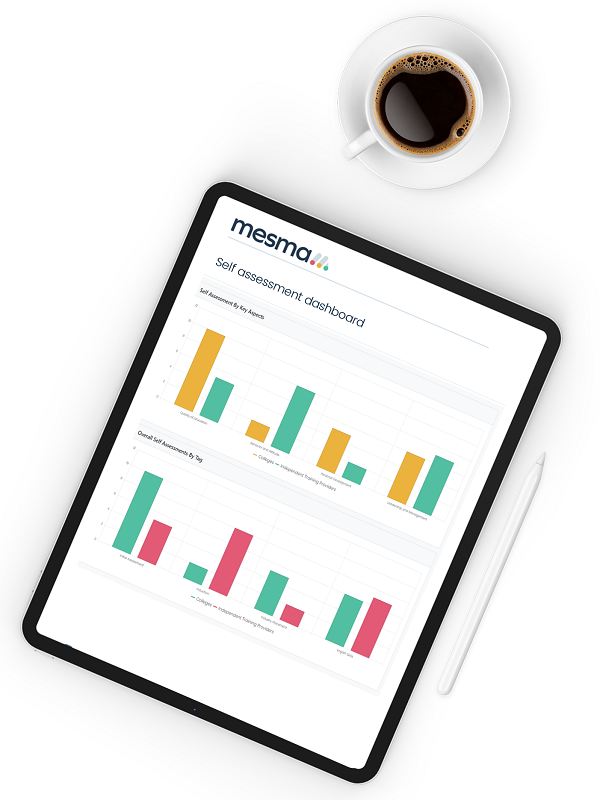ITPs: Five tips for more effective self-assessment

Louise Doyle, CEO of quality assurance software specialist Mesma, considers ways for independent training providers (ITPs) to improve their self-assessment.
If you lead on quality for a small ITP, the SAR and QIP development is an extra hat on top of the ones you probably wear already. So, to help navigate your way through, they are some simple yet effective ways to help you get maximum value for your efforts – and upload your report to the Ofsted gateway early.
- Move away from the Ofsted handbook
If you start with the handbook, you can easily get lost in the weeds rather than focus on what you set out to achieve. What goals did you set for yourself? Were they the right ones? How did you plan to measure success? Was it clear to everyone that’s what the goals were? Did you achieve them? Is it an improving picture from previous years? Did you live your values? What got in the way if you didn’t? What problems do we want to resolve? Relying solely on the regulatory framework to inform your SAR can be blinkered and too often, creates lots of writing without much meaningful discussion.
- SAR isn’t a one-person job
Too often in small ITPs, self-assessment falls to one person, which can be overwhelming and risks a report that isn’t owned by everyone. Open up the process: consider how to capture the voice of your learners, employers, and staff as part of the process. Use your board or external support to bring objectivity to the process. Remember it’s an opportunity to celebrate, support, and challenge everyone in your organisation, sharing both what you are collectively most proud of as well as the frustrations that impact on the learner experience.
- The Ofsted Framework is your friend (mostly)
Yes, the Ofsted framework brings structure a SAR report because you’re speaking the same language as inspectors when they arrive. However, if you want to bring yours to life and create a birds-eye view of your provision…
- Explore whether you have high expectations for learners as part of your vision and values. How well you engage with external stakeholders in your community to develop this? (Leadership and Management)
- Head to ‘Curriculum Intent’ to consider how that vision translates into your curriculum offer and the structure of your programmes (don’t forget to consider how you intended to cover the key topics in ‘Personal Development’ as integral to the programme. (Quality of Education)
- Follow the flow down to Curriculum Implementation and alongside this, consider ‘Behaviours and Attitudes’ of your learners. (Quality of Education)
- Finish the remaining sections of ‘Leadership and Management’ reflecting on the effectiveness of performance management, governance, and safeguarding arrangements.
- And only then, consider ‘Impact’, reminding you of the emphasis on progress from individual learner start point (Quality of Education).
Following this route through the handbook helps to provide structure for your own unique story.
- You don’t need to write as much as you think you do
Less can be more. The more you write, the more you’ve dropped into describing what you do rather than focusing on evaluating what you do. You might be surprised to know that some of the biggest providers in the country limit their overall SAR to a maximum of 15-20 pages. Placing a limit on length forces you to use your words wisely. You don’t need to describe or write lots of detail about the evidence – just reference it. Also, a SAR reads well when people hear the voice of your learners, employers, and team members to illustrate your judgments.
- Focus on impact – ALWAYS
This applies to both your SAR and your Quality Improvement Plan (QIP). Your aim is that together, they inform fast, clear, and impactful decision-making. When you evaluate performance, come back to the impact your actions have had on your learners. When you write your QIP, be clear about the result you want your actions to have on your learners. The SAR should inform the activities in your QIP. Often, there can be a disjoint between the two. And when you’ve got your final draft, ask someone who hasn’t been involved in its writing to take afresh a look to advice if they can see clearly the links between them – it can be hard to see the wood for the trees.
Until the end of February 2023, new Mesma customers (on a paid plan for Evaluate) can get 13 deep dive enquiry templates included. Deep dive enquiries help you to measure the impact of your quality improvement activities and easily capture data and insights for your next SAR.
Mesma has also created a free 4-day SAR development timetable which guides you through these steps. It’s available to all users on the free Starter version of the Mesma software platform, and can be found in the Mesma help centre. More at www.mesma.co.uk











Responses